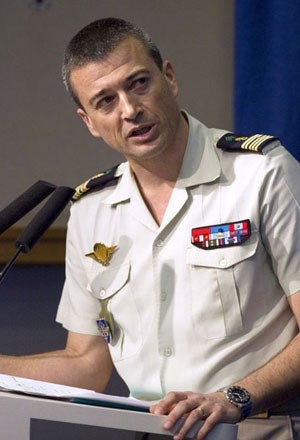France secretly armed Libya's rebels for push on Tripoli

France has been covertly arming rebels in the mountains south of Tripoli eyeing a push on the Libyan capital to hasten the demise of Colonel Muammar Gaddafi’s 41-year regime.
The French military confirmed yesterday that France, a lead player in the Nato alliance tasked with enforcing a no-fly zone in Libya, had air-dropped light weapons and munitions to the rebels earlier this month.
It is the first time that a Nato country has supplied military aid to Libyan rebels directly, and it is likely to anger countries such as Russia and China, which have accused the military alliance of overstepping its original United Nations-backed mandate to protect civilians.
News of the airdrop first emerged yesterday in French newspaper Le Figaro, which, citing a secret intelligence memo and unnamed sources, said that France had delivered heavy arms to the rebels, including anti-tank missiles, equipment that could significantly alter the balance of power between rebels and regime forces fighting just south of the capital.
The newspaper, which said France made the decision without consulting its Nato partners, claimed that the weapons were intended to help rebels push through to the capital, Tripoli, and encourage a popular uprising in the city, which has seen only sporadic opposition to Col. Gaddafi. “If the rebels can get to the outskirts of Tripoli, the capital will take the chance to rise against Gaddafi,” said an official quoted in the report.
France was one of the chief backers of military intervention in Libya, and along with Britain, it has led the near daily airstrikes that began in March targeting Col Gaddafi’s military assets.
But despite Western assistance, the revolt against Col Gaddafi’s regime that started in February has only made faltering gains, with rebels hampered by a lack of training, equipment and funding. Nato allies had until now limited themselves to delivering money and advice to the rebels, mainly in the east of Libya where rebels have formed a transitional council in Benghazi. British Foreign Secretary yesterday confirmed that £100 million had been transferred to rebels in Benghazi amid earlier complaints that promises of money had not materialised.
A French military spokesman yesterday refuted Le Figaro’s claims that France had supplied heavy arms, saying that the rebels, Berbers in the western Nafusa mountains, had appeared vulnerable to attacks by loyalist forces, prompting the decision to drop assault rifles and ammunition for their own protection.
“We began by dropping humanitarian aid: food, water and medical supplies,” Col. Thierry Burkhard told Agence France-Presse. “During the operation, the situation for the civilians on the ground worsened. We dropped arms and means of self-defence, mainly ammunition.”
The Berber rebels in the Western mountains are much smaller in number than their counterparts in eastern Libya and Misrata, a city close to Tripoli that has seen fierce resistance, and so their gains against loyalist troops have been fewer. Nevertheless, the weapons drop appears to have bolstered their efforts, enabling them to push through to the town of Bir al-Ghanam in a surprise breakthrough at the weekend, bringing them roughly 50 miles south of Tripoli, the closest they have come yet to the capital.
For some in Nato, the gains are not happening fast enough, and France and Britain badly need to show progress in the assault on Col Gaddafi’s military resources if they are to deflect growing criticism of the mission. To some, the rebels in the west offer the best chance of that.
Both Russia and China have been highly critical of the military operation in the wake of civilian casualties, and the alliance itself has been fractured by internal divisions over mission creep. Dutch Defence Minister Hans Hillen yesterday described some of his Nato allies as “naïve” for thinking that a bombing campaign would convince Col. Gaddafi to step down or change course.
“Libya is too big and all the military goals too big,” he said. “The solution should be a political solution and the military only helps to achieve this and the question is: ‘how long will you push on the military side if the political one doesn't move?’”
Join our commenting forum
Join thought-provoking conversations, follow other Independent readers and see their replies
Comments